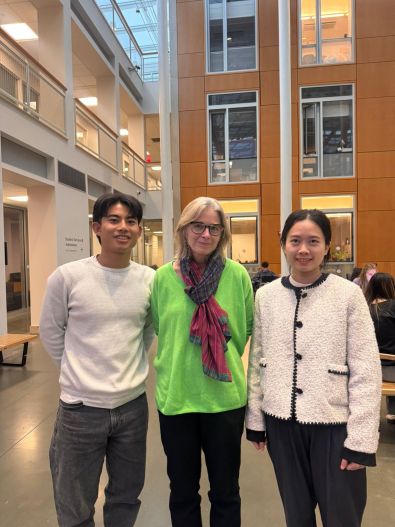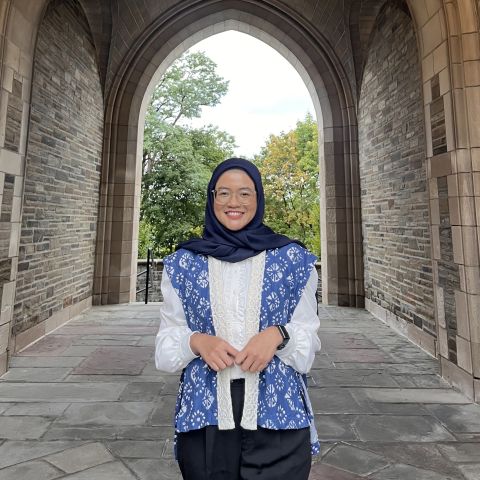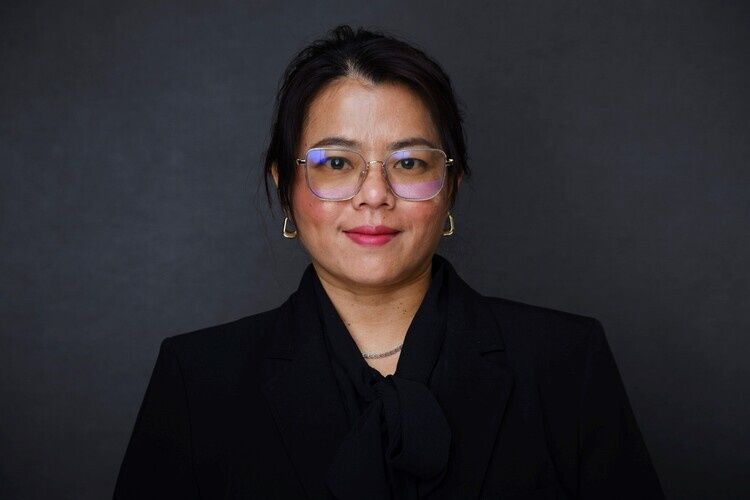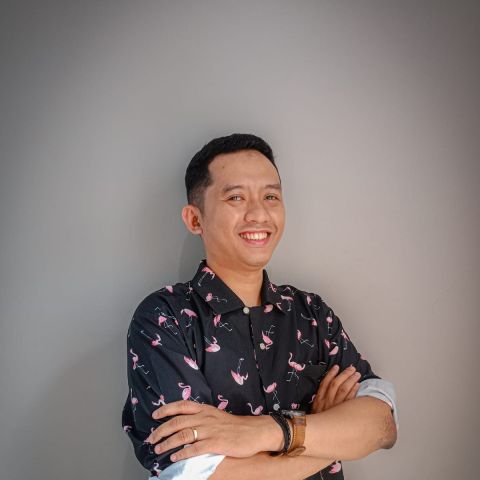Southeast Asia Program
Students Reflect on Ashley Thompson's Golay Lecture

Restitution in the Making of Southeast Asia Today.
It was a pleasure to welcome Professor Ashley Thompson (SOAS University of London) for the 13th Frank H. Golay Memorial Lecture on November 6.
Following her talk, “Restitution in the Making of Southeast Asia Today,” SEAP graduate and undergraduate students had the opportunity to meet with her and reflect on her work.
Carrie (MA student, Asian Studies) shared that Professor Thompson’s visit “offered us a deeper understanding of restitution as a process shaped by state power and cultural sovereignty that still define Southeast Asia. During our conversation, Prof. Thompson’s reflections on learning Khmer and collaborating with practitioners encouraged us to think about how we understand the field, connect with local people, and build meaningful research in and for Southeast Asia.”
Mutty Un (B.S. Global Development ’26) added that “Professor Thompson's perspectives on restitution and museums have transformed how I think about the museum as an institution that reproduces colonial behaviour and power dynamics. Beyond expanding on topics discussed during her Golay, it was a pleasure to learn about how she came to study Cambodia, including her influential role in shaping Cambodia's cultural restoration and conservation institutions. ”
Additional Information
Program
A United States That is No Longer a Leader in Asia

Tom Pepinsky, SEAP
In this op-ed, Thomas Pepinsky (SEAP/SAP) writes, “Weakened institutions, politicized governance, and unchecked executive power in the United States leave its Asia Pacific allies with an uncertain future.”
Additional Information
Multiple Diasporas: The Class and Geopolitical Dimensions of Chinese Migration to Malaya and Singapore

December 5, 2025
4:30 pm
281 Ives Faculty Wing, Doherty Room
This multi-disciplinary panel brings together scholars studying Chinese migration to 20th century Malaya and contemporary Singapore. The overarching concern is to assess how geopolitics and class differentiation have shaped the experiences of Chinese migrants to the region as well as their local reception. The speakers hail from anthropology, labor relations, and history, and will discuss the experiences of Chinese university students in Singapore amid a rapidly shifting geopolitical landscape; the responses and interactions of local industrial workers towards their migrant counterparts, including Chinese workers, in contemporary Singapore; and how racialized citizenship policies in Cold War-era Malaya and Singapore reshaped the Chinese diaspora's relationship to China.
Panelists:
Zach Howlett, Associate Professor, Sociology and Anthropology, National University of Singapore
Wen Li Thian, PhD student, ILR, Cornell University
Darren Wan, PhD student, History, Cornell University
Moderator: Shaoling Ma, Associate Professor, Asian Studies, Cornell University
Additional Information
Program
Einaudi Center for International Studies
Southeast Asia Program
East Asia Program
Anthropology Colloquium: Xinlei Sha

November 14, 2025
3:00 pm
120 Mary Ann Wood Drive, B21
Title: Indebted Sisterhood: Sex Work and Social Reproduction Across Kenya, Vietnam, and China
Abstract: The heightened China’s presence in Kenya has provoked rampant rumors around Chinese women working in local brothels or Vietnamese women being trafficked to Chinese sham entertainment business. While the rumors demonstrate growing public attention to gendered labor in connection to Chinas One Belt and Road Initiative (BRI), they also reveal lack of reliable information about immigrant life of Chinese and Vietnamese female sex workers (VCFSWs) in Kenya. Hence, VCFSWs more likely suffer from police arrest, immigration scrutiny, and even Uber driversviolence. Drawing on fieldwork of six Chinese hostessing nightclubs in Nairobi, Kenya, this talk focuses on VCFSWs’ interpersonal relationships with their employer and sex worker “sisters”. Although the international anti-trafficking campaigns and Kenyan authorities stereotype VCFSWs as trafficked victims or indentured labor, this talk highlights debt embedded in culturally-mediated emotional ties and social reproduction that disrupts popular belief of non-Western migrant sex workers as temporary, and forced labor.
Xinlei Sha is PhD candidate in Anthropology at Cornell University whose research examines the circulation of intimate labor and relations alongside Chinese business and immigration in Kenya. This research was supported by the Wenner Gren, Social Science Research Council, East Asian Program, and among others.
Additional Information
Program
Einaudi Center for International Studies
Southeast Asia Program
Southeast Asian Summer Studies Institute (SEASSI)

Applications open, funding options available.
Applications for SEASSI 2026 Now Open!
Additional Information
World in Focus: Gaza–Israel Conflict: Regional and International Impacts

November 11, 2025
4:00 pm
Uris Hall, G08
Join Einaudi Center experts for World in Focus Talks on global events in the news and on your mind. Our faculty's research and policy insights put the world in focus.
This year we’re hosting informal campus discussions on many Tuesday afternoons. This week’s topic:
The Gaza–Israel conflict escalated dramatically in October 2023, following Hamas's attack on Israel and Israel's subsequent military campaign in Gaza. After intense fighting that caused massive Palestinian casualties and displacement, a ceasefire and the outline of a peace agreement have been announced. These events will have far-reaching consequences for the region and the world: heightening political and security tensions in the Middle East, disrupting international humanitarian and legal systems, and straining international relations.
How is the Gaza–Israel conflict transforming the Middle East and challenging the international order?
***
Featured Speakers
Sandra Babcock (SEAP) | Law SchoolAlexandra Blackman (SWANA) | GovernmentEsam Boraey (PACS, Migrations) | GovernmentPeter Katzenstein (IES, PACS) | GovernmentJoseph Margulies (PACS) | GovernmentJake Silver | Near Eastern StudiesChantal Thomas (IAD) | Law School
***
Conversations Matter at Einaudi
This conversation is hosted by the Mario Einaudi Center for International Studies and its regional and thematic programs. Find out what's in store for students at Einaudi!
Additional Information
Program
Einaudi Center for International Studies
Reppy Institute for Peace and Conflict Studies
East Asia Program
Southeast Asia Program
Latin American and Caribbean Studies
Institute for African Development
Institute for European Studies
South Asia Program
Migrations Program
Southwest Asia and North Africa Program
Herlina Oktavianti

Graduate Student
Degree Pursued: MPA
Anticipated Degree Year: 2026
Committee Chair/Advisor: -
Discipline: Public Policy
Research Countries: Indonesia, Laos, Singapore, Vietnam
Additional Information
Einaudi Kicks Off Yearlong Conversation on Foreign Aid
Lund Debate 2025
Undergraduate Global Scholars joined debaters to discuss “Is (Cutting) International Aid Good?”
For decades, international aid mainly flew under the radar of public opinion. Politicians from across the ideological spectrum lauded programs that saved lives, nurtured democracy, and promoted American values and interests. Except during wars and natural disasters, aid was rarely in the news.
That changed on January 20, 2025, when President Donald J. Trump issued an Inauguration Day executive order freezing all U.S. foreign assistance. Within weeks, Secretary of State Marco Rubio closed the headquarters of the U.S. Agency for International Development (USAID) and canceled 83% of the agency’s programs. Suddenly, foreign aid was at the center of an intense debate over national priorities and America’s place in the world.
January 20 was also the day that political scientist Ellen Lust arrived at Cornell to direct the Mario Einaudi Center for International Studies as the John S. Knight Professor of International Studies. One of her first actions was selecting a theme to guide the center’s programming and provide a focus for its Undergraduate Global Scholars for the 2025–26 academic year.
Lust, who is also a professor in the Cornell Jeb E. Brooks School of Public Policy and the Department of Government in the College of Arts and Sciences, chose “Is (Cutting) International Aid Good?” She said she meant the simple, yes-or-no question to be provocative at a university where “everyone understands how complex these issues really are.”
“We have faculty, students, and staff engaged in food security, agriculture, development, public health, nutrition, education, economics, international relations, area studies, and so many other fields,” Lust said. “My hope was that this could provide an opportunity for us all to put our heads together and think about what can be done in the future.”
Lust recruited international development specialist Paul Kaiser to lead the conversation as the Einaudi Center’s practitioner in residence. Kaiser has worked on public policy and education reform in sub-Saharan Africa, South and Southeast Asia, and the Pacific Islands, with agencies including USAID, the Millennium Challenge Corporation, and the World Bank.
“There have always been legitimate questions about aid dependency and corruption and the effectiveness of aid, but we’re facing a much more existential question, which is should there be any aid at all?”
“For me, aid starts off as a moral issue, but it's also an economic issue, it's a political issue, it's a social issue,” Kaiser said. “There have always been legitimate questions about aid dependency and corruption and the effectiveness of aid, but we’re facing a much more existential question, which is should there be any aid at all?”
That question was on the table at Einaudi’s Lund Critical Debate, which Kaiser moderated on October 22 in a packed Lewis Auditorium in Goldwin Smith Hall. The debaters were Cornell faculty members Chris Barrett, an agricultural economist and food policy expert, and Muna Ndulo, an expert in international law and governance.
“We need more, not less aid,” argued Barrett, the Stephen B. and Janice G. Ashley Professor of Applied Economics and Management in the Dyson School of Applied Economics and Management and a professor in the Cornell Brooks School of Public Policy. “We need it for moral reasons, for security reasons, and for economic reasons. But it needs to be fundamentally different than it has been in the past.”
Specifically, he said, “we need less bilateral aid—that is, government-to-government aid to support country-specific things—and we need far more aid for what some of us term ‘international public goods’—for things that cut across the global community.”
“We need more, not less aid. We need it for moral reasons, for security reasons, and for economic reasons. But it needs to be fundamentally different than it has been in the past.”
Those include agricultural and biomedical research, infectious disease monitoring and prevention, emergency response, and climate change mitigation. “These are things that we underinvest in massively” despite their high long-term economic returns, Barrett said. Most are better delivered by multilateral agencies and organizations than by individual governments, he said.
Ndulo, the William Nelson Cromwell Professor of International and Comparative Law at Cornell Law School, agreed that aid can be helpful and sometimes essential, but he said it can also do damage. “A constant feature in the field of development is the firm belief that low-income countries will always be poor and desperately in need of foreign assistance,” he said. “This mentality shapes the sorts of solutions that get fostered in those countries.”
Ndulo and Barrett both observed that aid often prioritizes donor countries’ interests over those of the recipients. Increasingly, Ndulo said, donors are conditioning aid on recipients’ willingness to support their foreign policy objectives. Overall, Ndulo said, aid has less impact than international trade, foreign direct investment, or remittances from people working abroad.
“If we focus more on fairer ways of trading,” he said, “we might not need as much aid.”
The Future of Aid
Rethinking the future of aid is the assignment for the 15 Undergraduate Global Scholars selected by the Einaudi Center in October. Over the course of the year, they will meet with experts, conduct research, and take part in discussions and events.
“For me, it’s personal,” said Sarvesh Prabhu ’28, who studies entomology and environmental sustainability in the College of Agriculture and Life Sciences. As a teenager, Prabhu worked at an international agricultural research center in his native India. He could see how important agriculture was to the nation’s development, but he also saw how aid could undermine the country’s sense of self-determination.
Ariela Asllani ’26 also feels a personal connection. A public policy major in the Brooks School, she grew up in Albania with parents who housed war refugees from Kosovo in the 1990s. She said Kosovars were grateful for U.S. aid, even erecting a statue of President Bill Clinton after the war ended. But many of the programs the Americans started collapsed after they left, and she has witnessed how aid can fuel corruption and crime. “My interest is the intersection of military, intelligence, law enforcement, and humanitarian aid actors,” she said.
“I’ve noticed a change in the conversation around aid,” said Iskander Khan ’26, a government major in the College of Arts and Sciences. “People will talk about it in a humanitarian sense, then when they’re pushed, they justify it as a security issue. I thought these were two very different things. But the discussions we’ve been having make me realize that they’re a lot more intertwined than I realized.”
The Einaudi Center’s Lund Critical Debate Series is made possible by the generosity of Judith Lund Biggs ’57. Watch the video of the debate below. The future of aid will also be the subject of Einaudi’s 2026 Bartels World Affairs Lecture, to be delivered by former USAID administrator Samantha Power in April.
Story by Jonathan Miller. All photos by Simon Wheeler.
Additional Information
Women and Democratic Change in Myanmar

November 12, 2025
12:00 pm
Myron Taylor Hall, Room 186
The Dorothea S. Clarke Program in Feminist Jurisprudence Presents: Women and Democratic Change in Myanmar
About the Talk
Women in Myanmar are driving social justice, criminal justice, and political parity, especially since the 2021 military coup. Social norms and cultural barriers hinder women's access to social justice in healthcare, education, employment, family matters, and cultural and religious rights. On the other hand, gender stereotypes reduced women's prospects of standing for office and being chosen by their party, which can be seen in Myanmar's 2008 constitutional elections. Myanmar women face economic exploitation, sexist oppression, racial and ethnic discrimination, trafficking, and gender-based violence, all of which are increasingly becoming political issues. Following a woman's rape case, Rohingya were forcibly displaced in 2017. Women have always experienced systematic discrimination, preventing them from accessing social, criminal, and political justice. However, women keep driving and participating in politics, even in armed conflicts, with the resilience of desire, love, caring, support, patience, and peace to make Myanmar a democratic country.
(***this topic is based on an unpublished research paper.)
About the Speaker
Su Yin Htun is an Institute of International Education Scholar Rescue Fund (IIE-SRF) Fellow and Visiting Scholar in the Einaudi Center for International Studies' Southeast Asia Program. Ms. Htun is a law professor who has participated in the Civil Disobedience Movement.
This talk will be followed by a Q&A session.
RSVP for lunch here: https://cornell.ca1.qualtrics.com/jfe/form/SV_ctILNP7bnjlfPp4
To attend via Zoom, register here: https://cornell.zoom.us/meeting/register/QGjdr8mdTQuHRTIXfYrVyQ
Additional Information
Program
Southeast Asia Program
Einaudi Center for International Studies
Asriandi Masnar

Graduate Student
Degree Pursued: PhD
Anticipated Degree Year: 2029
Committee Chair/Advisor: Robin Dando
Discipline: Food science & Technology
Primary Language: Indonesian
Research Countries: Indonesia
Research Interests: Sensory science and food evaluation, descriptive analysis, consumer acceptance testing, sensory perception.
